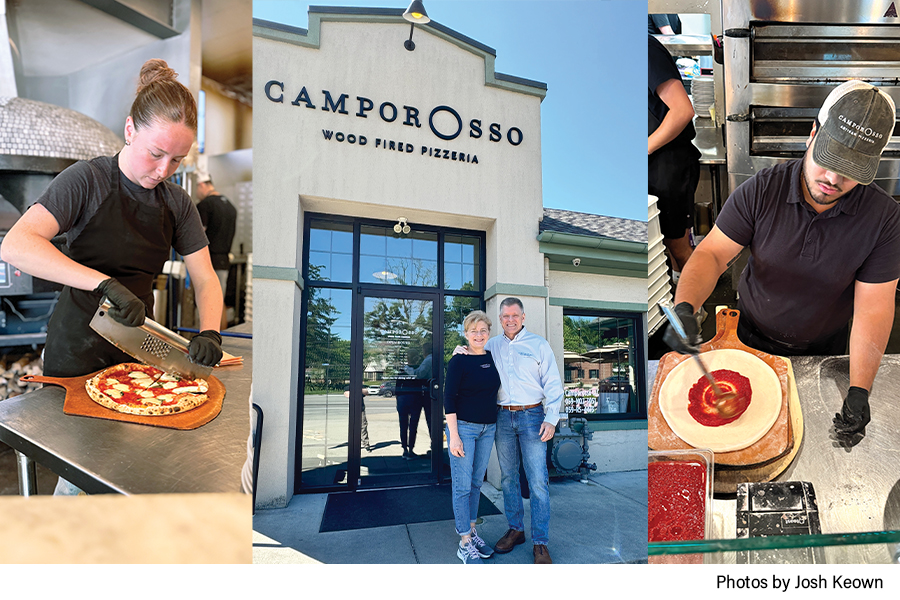When Patrick Fruin purchased Flingers Pizza Pub in Bloomington, Illinois, in 2006, he took control of a three-year-old, by-the-slice pizzeria nestled in between college bars and capturing about $250,000 in annual sales.
Over the subsequent 13 years, Fruin built Flingers into a Bloomington institution. He purchased a 3,800-square foot building on Vernon Avenue and successfully transformed Flingers into a 165-seat, full-service pizzeria collecting $2.5 million in annual revenue.
“A dream realized,” Fruin says.
But by 2019, Fruin’s passion for the business waned amid 100-hour weeks and the constant hustle. Yet more, he felt Flingers had reached peak valuation and it was time to sell.
“A touch bittersweet, but I had a nice run,” says the 37-year-old Fruin, who sold the business last September to Tim Cummings.
Restaurants change hands every year across the U.S. In some cases, the business is passed along to a family member, a long-time employee or business partner. In others, an outside buyer purchases the business. At times, the exit is emotional; at others, it’s freeing. In just about every sale, though, a mix of thoughtful planning, earnest preparation and professional help spurs a more seamless transition.
Planning with a purpose
When Chris Hansen exercised the five-year option on his lease at Pizzeria Caldera in Jackson Hole, Wyoming, in 2016, he also began evaluating potential exit strategies. With three years left on his lease, he then initiated direct conversations with his landlord about continuing the lease.
“I knew the location and the lease were two of the most important aspects of a sale, so I wanted to get a hold on that early,” says Hansen, who opened Pizzeria Caldera in 2011.
Such proactive, purposeful planning is vital to transferring ownership of a restaurant given the various issues that require attention. For instance, what’s prompting the sale – retirement, illness, change of pace, monetary reasons or something else? Is there one location or multiple units? Is it a family business or a franchise? Does the seller own or rent the building? What is the market value of the assets? Are there other investors, tax issues or outstanding debt? Is the owner open to carrying a portion of the potential buyer’s debt?
“There are a lot of questions … a seller must know the answer to before we can start talking about business transitions,” alerts Frank Choriego, associate director of the Kansas Small Business Development Center housed at Wichita State University.
In Hansen’s case, the proactive discussions he had with this landlord streamlined negotiations with buyers Joe and Annie Hurd, who wanted
assurances they could extend the current lease and, in fact, requested that promise exist in the sales contract.
“Lining up things with the landlord helped make everything a bit easier,” Hansen says.
Prepare to present the business
Adam Debussy with BizBuySell.com, a top online marketplace for business transactions, calls preparation “the most important ingredient to a successful sale.”
A serious buyer, Debussy notes, will want a complete view of business performance, which generally includes two to three years of financial statements. In addition, recurring revenue streams and well documented processes make for an easier hand-off and a less daunting acquisition for potential buyers.
“This is why it’s of the utmost importance to plan well ahead for an eventual exit,” Debussy says.
In seeking top dollar for Flingers, Fruin was committed to being an “open book” for Cummings. Fruin shared clean, buttoned-up books, tax documents that supported his profit-and-loss statements and comprehensive employee and operations manuals.
Buyers, meanwhile, must be prepared to show they are capable of the acquisition. Buyers should have a personal financial statement at the ready and have allowed sufficient time to secure funding. A buyer planning to use a traditional SBA 7a loan, for example, should expect the process to take 45 to 90 days. Highlighting experience is important as well if the buyer seeks an owner willing to finance a portion of the deal, something that is becoming increasingly commonplace in today’s market.
“Seller financing on its own increases the chances for a successful sale,” Debussy says. “However, the owner carrying the note must feel comfortable that the buyer can make the payments while also sustaining the business.”
Leveraging professional help
In the case of an outside sale, most business owners contact a business broker to assist with a professional business valuation. This allows the owner to evaluate if a sale is worthwhile and, if so, to establish an asking price.
Fruin hired a Chicago-based brokerage firm to market Flingers, handle all inquires and vet prospective buyers. In return, Fruin agreed to a 10 percent commission, a figure in line with the typical eight to 12 percent commission rate.
At Pizzeria Caldera, Hansen interviewed multiple brokers before selecting one with a strong network and broad marketing base. A residential real estate agent, Hansen might have been able to sell Pizzeria Caldera himself, though he quickly realized a business sale is “more of a legal transaction than a real estate transaction.”
To that point, Hansen considers a competent attorney just as important as a broker given how much of a business sale is accomplished through legal contract. In his transaction, attorneys from both sides drafted and examined documents and “did a lot of the heavy lifting” in the four months leading to the May 1, 2021 close.
Debussy reminds that sellers should also be prepared to stay on for some time after the sale, from a few weeks up to a year, to assist the incoming owner. Hansen, for example, had two months of set hours at Pizzeria Caldera before officially departing this business on July 1.
Attorneys and brokers can help negotiate and finalize those details, the price and tie up loose ends. In the Flingers’ deal, Fruin and Cummings “met in the middle” on the final price, which included a $90,000 bonus structure designed to retain staff and propel consistent operations.
“I’m still the landlord, so I have a vested interest in seeing [Cummings] succeed,” Fruin says, adding that his planning, preparation and professional help allowed him to avoid a “panic situation.”
Daniel P. Smith Chicago-based writer has covered business issues and best practices for a variety of trade publications, newspapers, and magazines.







